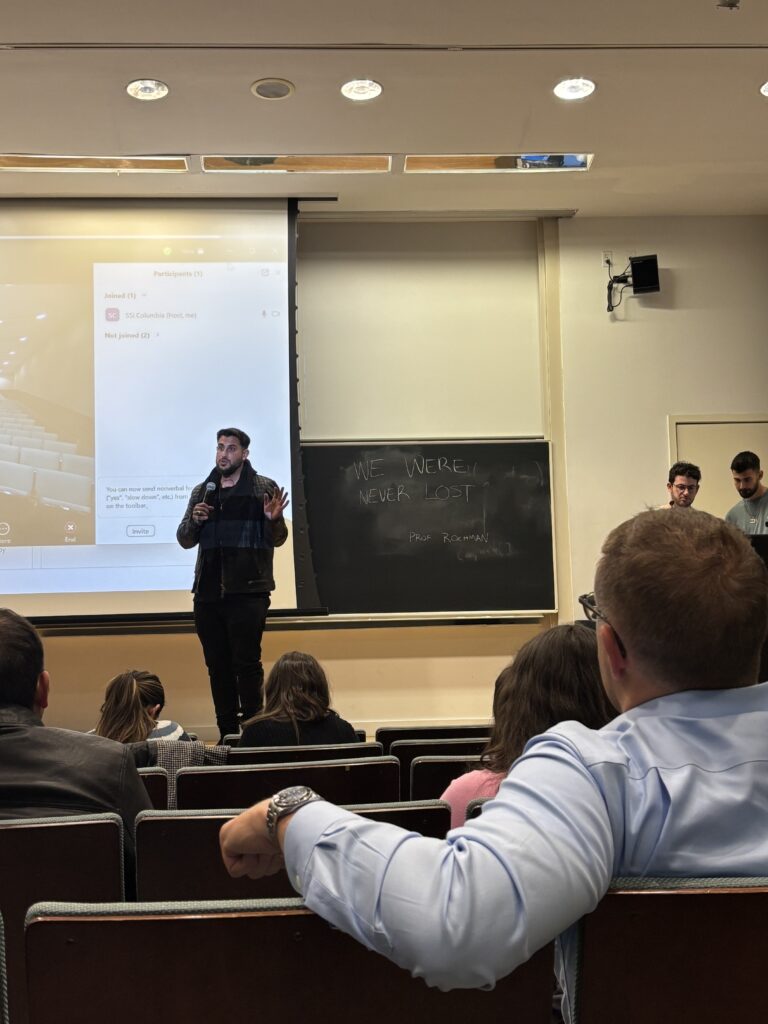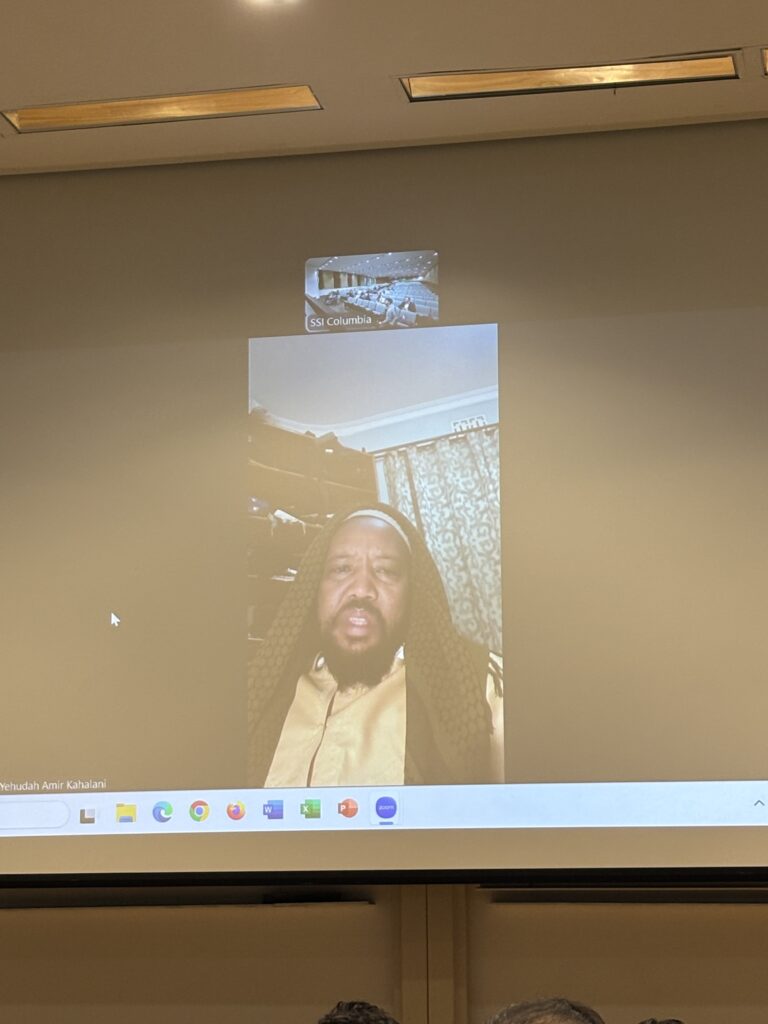The Columbia University Jewish community is no stranger to tears. However, last Tuesday night, the tears came not out of frustration or fear, but out of brotherhood.
Columbia Students Supporting Israel (SSI) hosted a screening of an episode of Rudy Rochman’s new docuseries, “We Were Never Lost,” a telling of the story of the “lost tribes” of Israel. After the screening, Rochman was joined on Zoom by Rabbi Yehudah Kahalani, the leader of the Tanzanian Jewish community. Mikael Rochman, Rudy’s brother and the current president of SSI, moderated a Q&A with Rabbi Kahalani.
Before the screening, Rochman introduced the premise of “We Were Never Lost” and his reasons for producing and hosting the series. He explained that while attending Columbia University, he would often sit and do his work in the Chabad house. One day, a woman walked into the Chabad house and began speaking to the rabbi, saying, “I just visited the Jewish communities of Uganda and Tanzania, and I brought you back this kippah.” Rochman could see the kippah, with its design of menorahs and Stars of David, and felt shocked. “What do you mean, there are Jews in Tanzania?” he said. Rochman described the feeling as follows: “Imagine you’re 24 years old and you find out, all of a sudden, that you have a brother or sister you never knew about.”

After the startling realization that there is still so much more to know about the Jewish people, Rochman began researching “lost” Jewish communities in Africa. The goal of the project is to be “the catalyst to raising awareness of who they are and bringing them back to our consciousness.” Rochman emphasized that the Jewish world as we know it descends from only 2.5 of the 12 tribes of Israel. Many of our brothers and sisters are living under persecution and in harsh conditions, and it is our responsibility to reunite the family. The idea of returning exiled Jews from the four corners of the world “has been a central theme in Jewish ideology…” Rochman hopes that “We Were Never Lost” will turn that tide from “practicing Judaism to putting it into practice.”
The episode screened at the event highlighted the Tanzanian Jewish community, which practices in secret, for the most part. The community is very small and faces immense persecution from Christian missionaries, who believe that all Jews should convert to repent for “killing Jesus.” Jews and Muslims in Tanzania are on good terms, calling each other “brother” and “cousin,” but because of harassment by Christians, practicing Judaism publicly is dangerous.
Rabbi Kahalani, a descendant of Yemeni and Ethiopian Jews, grew up in a quietly religious home in Tanzania. His father and grandparents always instilled in him Jewish values and traditions, and as he grew up, Kahalani’s father urged him to find the disconnected and fearful Jews of Tanzania and bring them back to their faith and community. Kahalani explained that his father told him, “We were never lost, only disconnected. You are making the disconnected connect again.”
For Tanzanian Jews (and many Diaspora communities in Africa), a big struggle comes from the Israeli government’s lack of recognition of their Judaism. Because these tribes have gone unrecognized by the more well-known Jewish communities for so long, there is a denial of their existence as Jews. This is especially offensive as Africa is about the closest a Jewish person could be to Israel while still being in the Diaspora. Efrat, Rabbi Kahalani’s wife, pleaded, “If [other Diaspora groups] could cross oceans and still be Jews, then why not us?”
After the conclusion of the episode, Rochman was joined on Zoom by Rabbi Kahalani, even though it was 3 a.m. in Tanzania. Kahalani answered attendees’ questions about the documentary and his experience as a proud Jewish leader in Tanzania.

Kahalani described the process by which he introduces new members to his community. It is a long process because there are no documents proving anyone’s Jewish identity, and their community does not recognize conversion because they have no rabbanut to perform it. Therefore, a lot of research goes into determining who can join the community.
Asked about the emotional toll of not being allowed to make aliyah, Kahalani responded, “Many in Israel say, ‘I’m home; why should I continue learning the laws?’ but I want to continue learning.” He also emphasized that in being a Jewish leader, he has yet to fulfill his promise to his father. “ I promised my father that I would fight for displaced Jews in Tanzania and bring them back to their roots. I know most of them, but they’re not comfortable. When they’re comfortable, I can go.” However, Kahalani described how many Yemenite Jews, such as him, have a tradition of setting aside gold to contribute to the construction of the Third Temple; When that begins, if he is not yet in Israel, he will go. “ Israel is our home, and there’s no doubt of that.”
Kahalani discussed what inspired him to come out of hiding as a proud Jew, other than the promise he made to his father. He explained that he always knew he was different and wanted to understand more about why. His grandparents always instilled in him a love of Israel, of the beautiful shuls in Yemen, and of Zion. His father also had Jewish friends from other African countries, and when they visited, Kahalani was inspired to find other African Jews and connect them with each other and Hashem. His final inspiration was the two missing Yemeni Torah scrolls, of which he said, “ That is the most inspiring, that one day we get to reunite with our ancient books.”
Kahalani left the students with one final message. “ We have one country and one constitution. The future is knowing the past, so if you don’t know where you are from, then you cannot also know your future. We must understand the history of our 12 tribes. We are pieces that are broken all over the world and we must connect them and go to one house, which is Israel. I advise you to know your history and work to connect the 12 tribes so we can all be one family, one Bnei Yisrael, one Am Yisrael.”
Find out more about “We Were Never Lost” at https://www.wewereneverlost.com. Follow Rudy Rochman on Instagram @rudy_israel.
Eliana Birman is the assistant digital editor for The Jewish Link. She is a student at Barnard College and lives in Teaneck.









